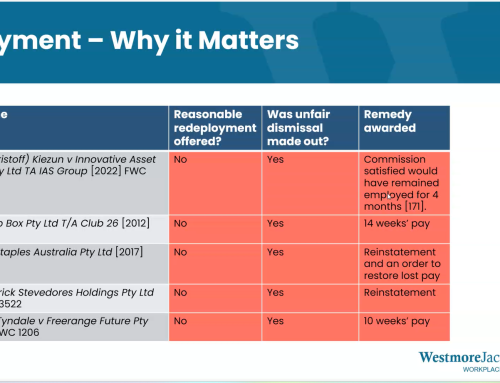
COVID-19 has created a fast-changing workplace relations space. There have never been so many options available to businesses to manage their wage costs. More are likely to come.
Below are six ways for employers to (currently) manage wage costs.
1. Stand down
Many businesses are standing down employees. However, employers should tread carefully before doing so. This is because we are in uncharted territory regarding the use of stand down in a pandemic situation.
Where there are no stand down terms in an employee’s contract or an applicable Enterprise Agreement, then the default power to stand down employees for many employers lies in the Fair Work Act 2009 (Cth) (“FW Act”).
Under section s524(1)(c) of that Act, an employee may be stood down without pay where:
- there is a stoppage of work for any cause;
- for which the employer cannot reasonably be held responsible; and
- the employee cannot be usefully employed.
All three requirements must be met for a lawful stand down.
Some businesses are subject to enforceable Government directives requiring them to close. In these situations, it may be clear that there is a stoppage of work for which the employer cannot be held responsible.
However, note the third requirement. If an employee can be usefully employed, they cannot be stood down. Cases indicate that there may not be a stoppage of work where there is retraining or other work to be done which would “confer some benefit upon the Employer”. For businesses that have not closed and are simply experiencing a downturn in revenue, stand down may be even harder to justify. As noted by the Fair Work Ombudsman: “Employers cannot generally stand down employees simply because of a deterioration of business conditions …” We agree. 2. Leave Another option is annual leave or unpaid leave. The default rule under the FW Act is that an employer and an employee should agree to the employee taking leave. However, new changes to certain Awards make it possible to direct employees to take leave in certain circumstances. 3. Reducing hours As a general rule, reducing a full-time or part-time employee’s hours must be agreed to by that employee. This is because, often, an employer has contractually promised to pay an employee for a set number of hours per week. In the case of a full-time employee, this is usually 38 hours per week. Employers should seek legal advice if they are considering this option. 4. Redundancies In some situations, government schemes and subsidies may not be sufficient to save jobs. Alternatively, the job may just not exist. In these circumstances, redundancies may be an option. Our article about top tips for redundancies can be viewed by clicking here. 5. Making use of Award changes A number of changes have been made to Awards in recent weeks. The Federal Government and Fair Work Commission have also indicated that more changes are on the way. On 28 March 2020, the Fair Work Commission approved a suite of changes to the Clerks – Private Sector Award 2010, including more flexibility for working hours and leave arrangements. Notably, the changes allow businesses to place employees on annual leave, and in some cases unpaid leave, with one week’s notice. Changes have also been made to the Restaurant Industry Award 2010 and the Hospitality Industry (General) Award 2010. 6. ‘JobKeeper’ wage subsidy On 30 March 2020, the Federal Government announced a wage subsidy for companies that have seen or expect to see a decline in turnover. The JobKeeper payment will give businesses a fortnightly payment of $1,500 per eligible employee to be passed on to those employees. The payment is intended to help subsidise ongoing employment. The Government has also indicated that employers who have already dismissed employees may re-engage them and use the subsidy. Employers should keep an eye out for the scheme’s fine print, which we expect will be available soon. Conclusion With the right assistance, businesses have several options available to help them manage wage costs. Keeping up one’s knowledge across all the options may yet prove to be the most challenging task. Adam Colquhoun, Principal This article is general information only. It is not legal advice. If you need legal advice, please contact us. [1] Communications, Electrical, Electronic, Energy, Information, Postal, Plumbing and Allied Services Union of Australia & Anor v FMP Group (Australia) Pty Ltd [2013] FWC 2554 at [36].






Leave A Comment